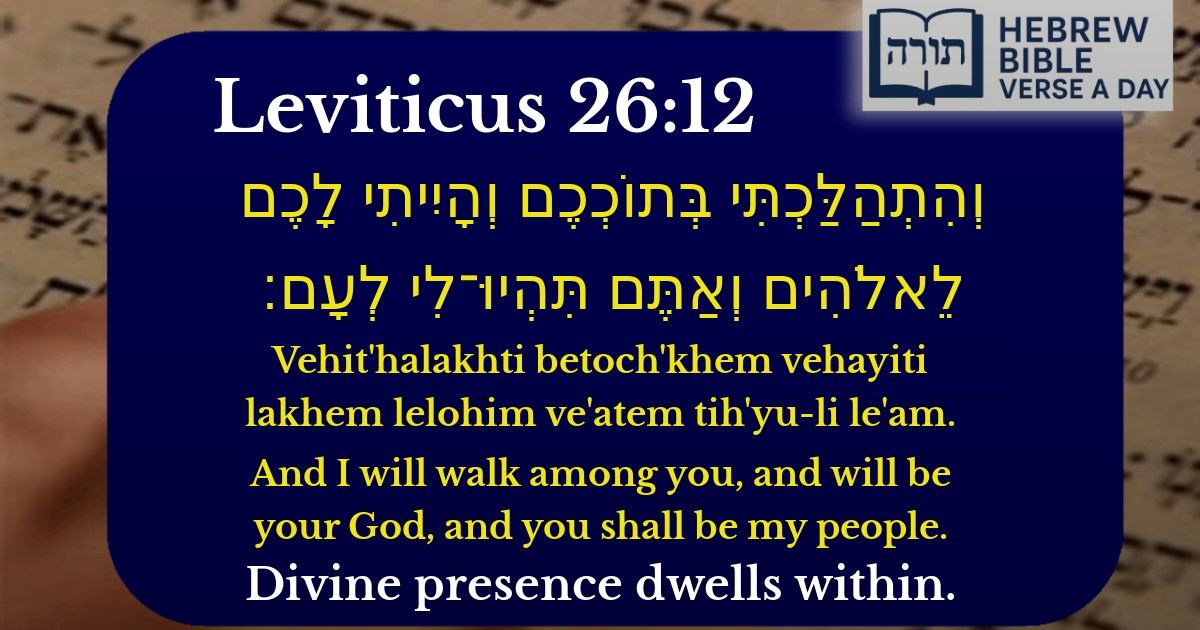Join Our Newsletter To Be Informed When New Videos Are Posted
Join the thousands of fellow Studends who rely on our videos to learn how to read the bible in Hebrew for free!
Hebrew Text
וְהִתְהַלַּכְתִּי בְּתוֹכְכֶם וְהָיִיתִי לָכֶם לֵאלֹהִים וְאַתֶּם תִּהְיוּ־לִי לְעָם׃
English Translation
And I will walk among you, and will be your God, and you shall be my people.
Transliteration
Vehit'halakhti betoch'khem vehayiti lakhem lelohim ve'atem tih'yu-li le'am.
Hebrew Leining Text
וְהִתְהַלַּכְתִּי֙ בְּת֣וֹכְכֶ֔ם וְהָיִ֥יתִי לָכֶ֖ם לֵֽאלֹהִ֑ים וְאַתֶּ֖ם תִּהְיוּ־לִ֥י לְעָֽם׃
וְהִתְהַלַּכְתִּי֙ בְּת֣וֹכְכֶ֔ם וְהָיִ֥יתִי לָכֶ֖ם לֵֽאלֹהִ֑ים וְאַתֶּ֖ם תִּהְיוּ־לִ֥י לְעָֽם׃
🎵 Listen to leining
Parasha Commentary
📚 Talmud Citations
This verse is quoted in the Talmud.
📖 Bava Metzia 59b
The verse is referenced in the context of discussing the divine presence among the Jewish people and the importance of unity and adherence to Torah commandments.
📖 Sotah 14a
The verse is cited to emphasize the concept of imitatio Dei, encouraging individuals to emulate God's attributes of kindness and compassion.


Rashi's Explanation
Rashi (Vayikra 26:12) interprets the phrase "וְהִתְהַלַּכְתִּי בְּתוֹכְכֶם" ("And I will walk among you") as a metaphor for Hashem's presence dwelling among Bnei Yisrael in a manner of companionship and closeness. He explains that this reflects a state of divine favor, where Hashem will "walk" with them in the Garden of Eden—a reference to the ideal relationship between Hashem and His people when they fulfill His commandments.
Rambam's Perspective
In Moreh Nevuchim (Guide for the Perplexed 1:54), Rambam discusses the concept of divine providence (השגחה פרטית) and explains that this verse signifies a unique relationship where Hashem guides and protects Klal Yisrael in a direct and personal manner. The phrase "וְהָיִיתִי לָכֶם לֵאלֹהִים" ("and will be your God") emphasizes the covenant (ברית) that binds Hashem to His people when they adhere to His Torah.
Midrashic Interpretation
The Sifra (Behar, Parsheta 2) elaborates on this verse, teaching that Hashem's presence ("Shechinah") dwells among Bnei Yisrael when they are united in righteousness. The Midrash emphasizes that this promise is conditional upon their observance of mitzvot, as stated in the preceding verses (Vayikra 26:3-11). The reciprocal relationship—"וְאַתֶּם תִּהְיוּ־לִי לְעָם" ("and you shall be My people")—highlights the mutual commitment between Hashem and Klal Yisrael.
Kabbalistic Insight
The Zohar (Vayikra 73a) interprets "וְהִתְהַלַּכְתִּי בְּתוֹכְכֶם" as an allusion to the indwelling of the Shechinah within each individual Jew when they sanctify themselves through Torah and mitzvot. This reflects the deeper mystical concept that divine energy permeates the world, particularly when the Jewish people live in accordance with Hashem's will.
Halachic Implications
The Sefer HaChinuch (Mitzvah 347) connects this verse to the mitzvah of sanctifying Hashem's name (קידוש השם), teaching that when Bnei Yisrael uphold their role as "עם ה'," they bring divine presence into the world. This reinforces the idea that Jewish identity and divine service are inseparable from the covenant.